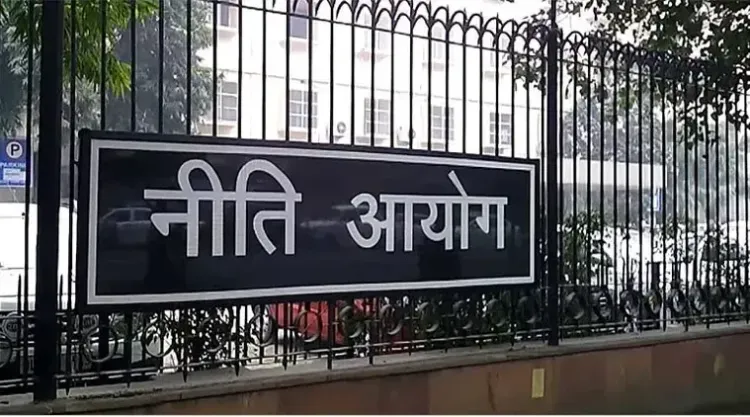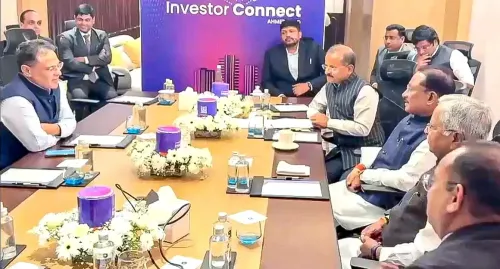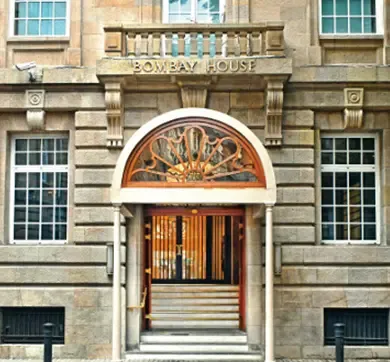What Blueprint Has NITI Aayog Launched for India's MSME Sector?

Synopsis
Key Takeaways
- Strategic reforms in financing are essential for MSME growth.
- Increasing access to credit is critical.
- Focus on skill development is needed to boost productivity.
- Support for digital marketing can enhance market access.
- Collaboration between institutions can bridge existing gaps.
New Delhi, May 2 (NationPress) The NITI Aayog has unveiled a comprehensive report aimed at tapping into the substantial potential of India's Micro, Small, and Medium Enterprises (MSMEs) through strategic reforms in financing, skilling, innovation, and market access.
Titled ‘Enhancing MSMEs Competitiveness in India’, this report, developed by NITI Aayog in partnership with the Institute for Competitiveness (IFC), examines the pivotal challenges impacting the competitiveness of India's MSME sector.
Utilizing firm-level data and insights from the Periodic Labour Force Survey (PLFS), it offers a roadmap to promote sustainable integration and enhance their engagement in global value chains.
The document emphasizes four critical sectors: Textiles, chemical products, automotive, and food processing, while shedding light on sector-specific challenges and opportunities that must be addressed to unlock the potential of MSMEs in India.
It scrutinizes existing national and state policies, revealing gaps in execution and a lack of awareness among MSMEs.
One significant finding is the marked improvement in MSMEs' access to formal credit.
From 2020 to 2024, the percentage of micro and small enterprises obtaining credit from scheduled banks increased from 14% to 20%, while medium enterprises experienced a rise from 4% to 9%.
However, the report indicates that a considerable credit gap persists.
Only 19% of the credit demands from MSMEs were met formally by FY21, leaving an estimated ₹80 lakh crore unfulfilled.
The Credit Guarantee Fund Trust for Micro and Small Enterprises (CGTMSE) has seen considerable growth but continues to face various limitations.
To close the credit gap and enable inclusive, scalable financing for MSMEs, the report advocates for a reformed CGTMSE, bolstered by institutional collaboration and more targeted services.
The report also addresses the urgent issue of skill shortages within the MSME sector.
A significant portion of the workforce lacks formal vocational or technical training, which impacts productivity and restricts the ability of MSMEs to scale effectively.
Many MSMEs also do not invest adequately in research and development (R&D), quality enhancement, or innovation, making it challenging to remain competitive in both national and global markets.
Furthermore, the report notes that MSMEs encounter obstacles in adopting modern technologies due to unreliable electricity, poor internet connectivity, and high implementation costs.
Despite state government initiatives aimed at supporting technological advancement in MSMEs, many businesses are either unaware of these schemes or unable to access them.
In its cluster analysis, the report concludes that upgrading outdated technologies and enhancing marketing and branding capabilities are essential for improving competitiveness.
Despite various MSME support policies and the recent boost through Union Budgets, the effectiveness of these measures is hindered by low awareness.
To improve policy outcomes, the report suggests stronger state-level design and implementation, emphasizing consistent monitoring, better data integration, and enhanced stakeholder engagement in policy development.
The report asserts that India's MSMEs can emerge as a vital engine of sustainable economic growth by concentrating on targeted interventions, establishing stronger institutional collaborations, and enhancing global competitiveness.
It recommends increased support for MSMEs through digital marketing training, partnerships with logistics providers, and creating platforms for direct market connections, particularly in high-growth regions like India's northeastern and eastern areas.
Additionally, a robust, adaptive, and cluster-based policy framework at the state level is urged to promote innovation, strengthen competitiveness, and empower MSMEs to facilitate inclusive economic transformation.








